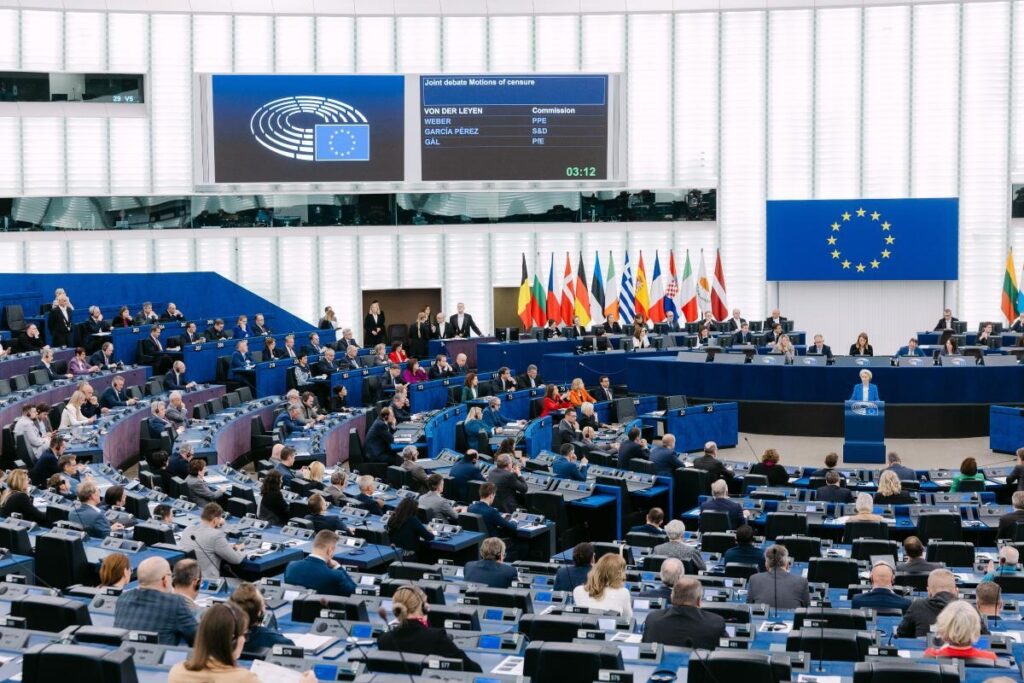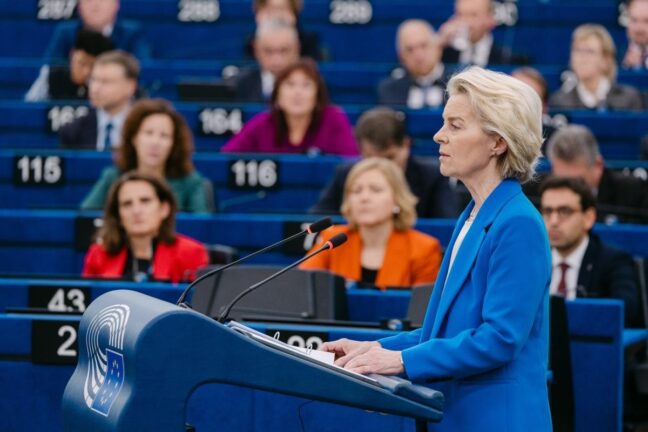Ursula von der Leyen was unfazed; he has been here before. The Commission president stood before the European Parliament on Monday, fending off barbs from both the far left and far right. This time, she was under threat of two censure motions. The first such motion against her was only a few months ago, in July.
On Monday evening, in a debate that often felt like a rerun, MEPs hurled criticism and support in equal measure. When it was her turn to speak, Ms von der Leyen fired back, accusing her detractors of doing the bidding of Vladimir Putin. Her high-profile party colleague and fellow German, EPP head Manfred Weber, joined the defence, slamming Patriots for Europe who had witheringly criticised the US trade deal by asking where their MAGA-friendly solutions had been hiding.
“Where were you back then, Alice Weidel, Viktor Orbán, [Matteo] Salvini, when von der Leyen was fighting for farmers?” he asked, referencing politicians by name.
There and back again
Over the course of an hour, MEPs lashed out over issues from Ukraine to Gaza and Israel, and trade policy. Ms von der Leyen, as in early summer, listened watchfully as opponents criticised the Commission for perceived mistakes: the US trade deal, the alleged abandonment of European farmers, not being vocal enough on Gaza or, conversely, being too tough on Israel, the Mercosur deal, and more. Ms von der Leyen answered in only a few minutes altogether, perhaps with less defiance than back in July, but along the same vein, warning Europe must not fall into “Mr Putin’s trap.”
Many who disagree with Ms von der Leyen’s leadership would be hard-pressed to vote against her for several reasons. They fear her fall would increase chaos; countries could lose important commissioner portfolios; the ensuing turmoil would benefit Europe’s enemies or trade adversaries. Additionally, no clear alternative better capable of pursuing badly needed goals exists at this pivotal moment. Importantly, many will not support what they see as a political stunt.
You might be interested

Serious concerns but risk of politicisation
Manfred Weber criticised the repeated use of censure motions, calling them tools for propaganda and national political campaigns — particularly in France, where Jordan Bardella, head of the Patriots, positions himself as a possible contender for the 2028 presidential election. He warned that such motions risk undermining what should be serious tools.
Others were critical of the Commission but also did not agree with the motions. The Socialists’ leader, Iratxe García (S&D/ESP), critical of the Commission’s approach on Gaza, nonetheless called out the Left for taking the steps it had.
“All you are proposing is a motion that you know will fail, and that could only pass with the votes of the far right,” she said, as opposed to putting faith in dialogue, negotiation and compromise.
Dissatisfaction vs tearing it all down
For her part, EC President Ursula von der Leyen acknowledged that many criticisms came from a place of “legitimate concern,” but this did not detract from her main message since the State of the Union in September: one of unity in the face of enormous stakes. “The world is in the most precarious and perilous state it has been for decades,” she said, making clear this was not the time for internal strife.
That did not stop the harshest barbs calling on her to simply leave. “You have been accompanying the genocide in Gaza by your cowardice and inaction,” Manon Aubry (Left/FRA), co-chair of the faction said, calling for her resignation right from the get go: “Leave.”
All you are proposing is a motion that you know will fail, and that could only pass with the votes of the far right. – Iratxe García (S&D/ESP)
While dissatisfaction with Ms von der Leyen’s leadership has deepened across parts of the political spectrum, few are ready to support a motion that could open the door to deeper instability. Most MEPs, even those critical of the Commission’s direction, appear prepared to withhold support for what they see as a partisan move unlikely to result in a better outcome. For now, frustration may simmer but only those on the hardest fringes appear intent on unseating her, though others may still attach their votes as a signal of protest, knowing the motion is unlikely to pass.
The plenary is scheduled to vote on the matter on this coming Thursday.










